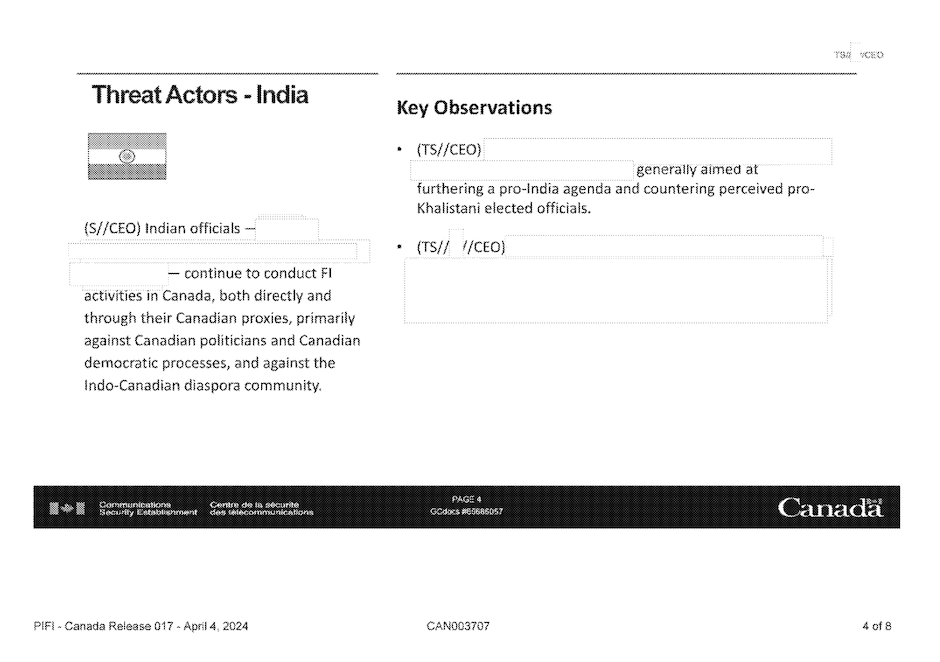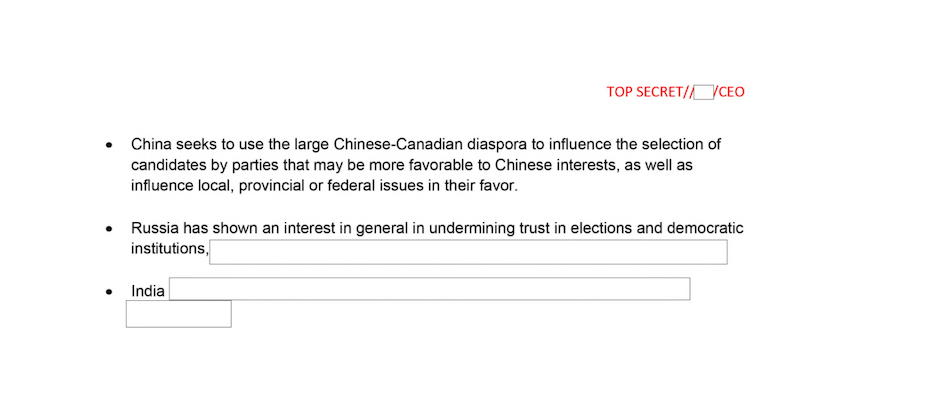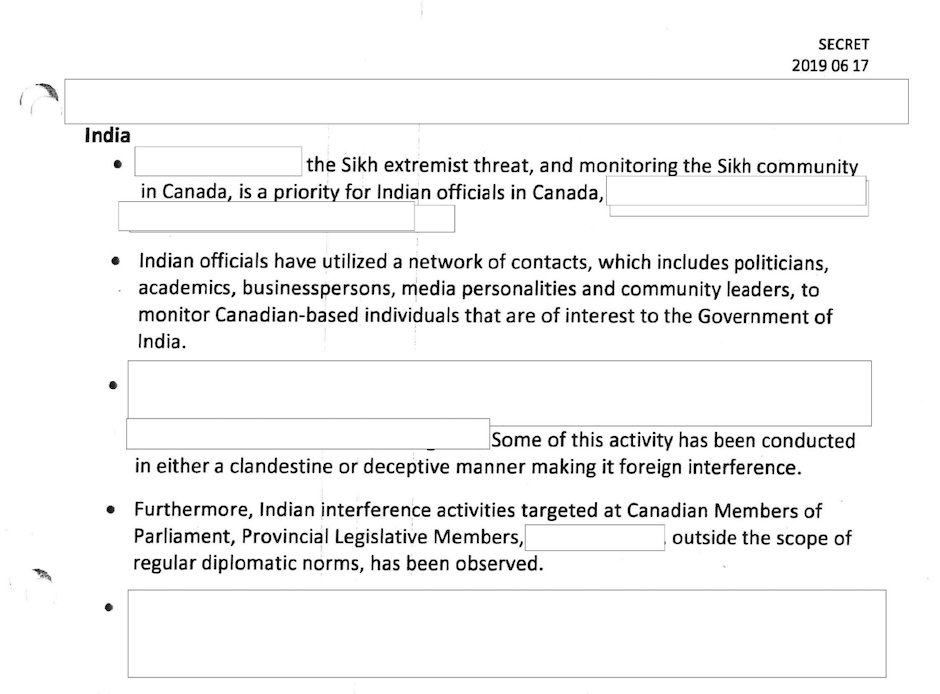
Foreign Interference Inquiry Highlights Canada’s Silence on Threats From India, Sikh Coalition Lawyer Says
Canada prioritized foreign policy over lives of Sikh Canadians
A lawyer representing one of the parties in the foreign interference inquiry says that the Canadian government had an abundance of intelligence regarding India’s foreign interference activities in Canada, but still chose not to act.
The Public Inquiry into Foreign Interference hearings wrapped up in mid-April, but a lawyer representing a coalition of Sikh groups in Canada says that the testimony of government witnesses left Sikh Canadians with more questions than answers.
The commission’s terms of reference had a specific focus on foreign interference as it pertains to the 2019 and 2021 federal elections, but Sikh Coalition lawyer Prabjot Singh says that the government’s mandate was too narrow and neglected to address the threat India poses to the Sikh diaspora – especially after the assassination of a Canadian on Canadian soil.
“Even after the assassination of a Canadian citizen, the government set the scope of the terms of reference and of the commission to specifically and solely look at electoral interference,” Singh told PressProgress.
“That is a problem and it pretty much undermined the commission’s ability to actually take a meaningful, comprehensive look at this problem in its entirety.”
Documents from the government show Canadian intelligence agencies were both aware of attempts by India to interfere in elections using “proxy agents,” but also that India’s media ecosystem was actively perpetuating and spreading disinformation about Canadian citizens and politicians.
During the commission, CSIS intelligence confirmed it considers India Canada’s second biggest foreign interference threat following China.

SITE Task Force Report (Public Inquiry into Foreign Interference)
Despite this, India was not initially included within the scope of the commission’s terms of reference until there was public pressure by Sikh community groups.
“For India not to be included in the terms of reference and for there not to be these public conversations even after an assassination is something that should be very surprising to Canadians,” Singh said.
According to Singh, despite a longstanding history of Indian foreign interference in Canada, adequate action has not been taken in response.
“One of the things that really stood out is the amount of evidence that the government and Canadian agencies have been sitting on about Indian foreign interference,” Singh said.
“Prior to participating there was almost a sense that maybe they’re not taking this seriously—maybe they’re not watching it; maybe it’s not on their radar. But when you look at it, there’s actually some very significant and very damning evidence about India’s activities, (including) the fact that security and intelligence agencies knew about it, and the fact that government officials and decision-makers were informed about it.”
Singh pointed out that many of the documents contained significant redactions, including one document that listed summaries of foreign interference activities by both Russia and China.
The third section listed a third country, but the entire section was redacted. Singh questioned Prime Minister Justin Trudeau during the inquiry whether one could infer if the third section pertained to India, but he said he could not answer for national security reasons.
“When a report was done by the NSICOP on this issue, all of the findings or recommendations about Indian foreign interference were completely redacted,” Singh said.
“There haven’t been meaningful steps taken by the government and transparency to acknowledge the threat publicly.”

CSIS briefing (Public Inquiry into Foreign Interference)
Singh says he believes the decision to focus the commission more on Russia and China and to a lesser extent on India during the inquiry was a deliberate decision in order to protect Canada’s foreign policy objectives.
“Some of those details are becoming a lot more clear that Indian foreign interference wasn’t addressed and confronted by Canadian agencies and by the Canadian government, and that failure to act was deliberately covered up by the government in pursuit of the policy objectives of maintaining ties with India and trying to build up trade relations,” Singh said.
“There is a massive gap and vulnerability in Canada’s national security architecture that allows foreign interference and our responses to foreign interference to be dictated by politics and that vulnerability allows the government to make its decisions based on partisan interests and electoral calculations as well as their policy priorities.”
Singh says Sikh Canadians are being used as a “bargaining chip” and the community is harmed as a result— including in the case of Bhai Hardeep Singh Nijjar who was murdered in Surrey, BC last year.
“If there’s a priority to engage in some kind of trade or seek India as a trade partner or strategic ally, the trade off is the rights and lives of Sikhs in this country and it seems that trade off has been considered and has been made,” Singh said.
“There’s a very clear line that can be drawn that the government bears responsibility, not because there was some kind of miscommunication or some failure, but there was an actual, deliberate decision not to do anything.”

CSIS intelligence report (Public Inquiry Into Foreign Interference)
One report from the Security and Intelligence Threats to Elections Task Force Report related to the 2019 federal election has three pages regarding foreign interference by India, all of which are completely redacted.
“The evidence shows us though, that there was a flurry of foreign interference activity that Canada has been monitoring, but it’s concerning and it’s really problematic that this hasn’t been a public conversation and that the government hasn’t done more to protect Canadians and has left the Sikh community hanging in the balance to bear the brunt of that violence and disinformation,” Singh added.
“India was granted complete impunity to continue engaging in foreign interference activities, those networks weren’t dismantled, threat reduction mechanisms weren’t used and then you have the assassination of Hardeep Singh in 2023. One of the most significant or pressing things for us right now is actually demanding some transparency from the government about what they knew and what they did or didn’t know and how that connects to the assassination.”

Classified briefing for political parties (Public Inquiry Into Foreign Interference)
Our journalism is powered by readers like you.
We’re an award-winning non-profit news organization that covers topics like social and economic inequality, big business and labour, and right-wing extremism.
Help us build so we can bring to light stories that don’t get the attention they deserve from Canada’s big corporate media outlets.
Donate



